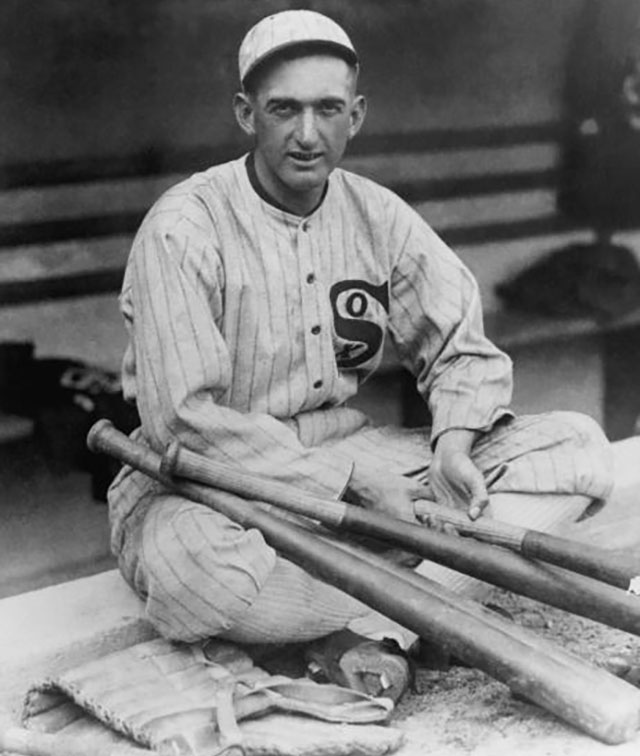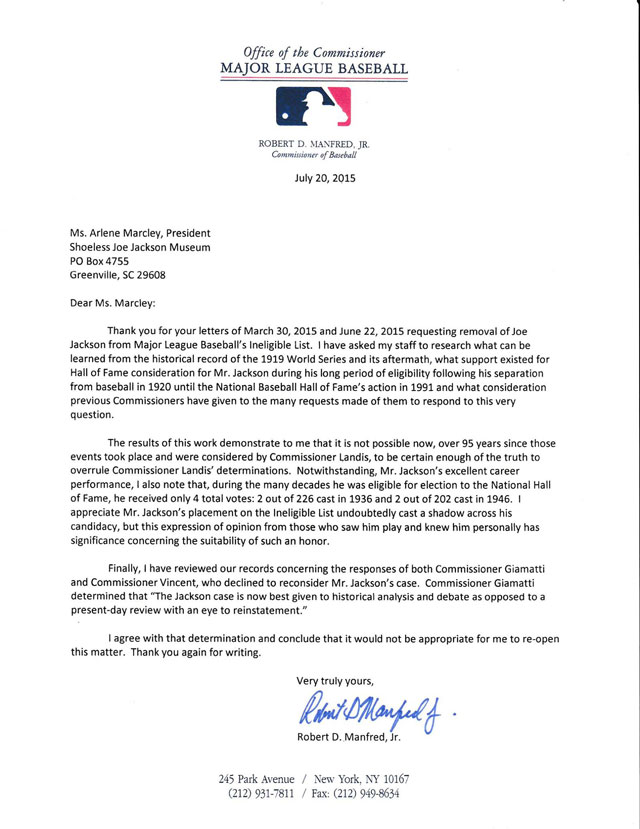
MLB denies reinstatement of 'Shoeless' Joe Jackson
Jackson, along with seven other members of the 1919 White Sox, have been banned from the sport since 1920 for a conspiracy to throw the World Series.

Supporters of "Shoeless" Joe Jackson hoped commissioner Rob Manfred would re-open Jackson's case for reinstatement, but it's not going to happen. In a letter sent in July to the curator of the Joe Jackson Museum in Greenville, S.C., Manfred told Arlene Marcley that Jackson's status won't change. Marcley made an announcement on the museum's Facebook page late Monday/early Tuesday after replying to Manfred's letter, asking for one more look at Jackson's case. After giving Manfred about a month to reply -- he apparently didn't -- Marcley went public.
Jackson, among a group of eight White Sox players accused, has been banned since 1920 for conspiring to throw the World Series the season before in exchange for money. It has been disputed frequently ever since what Jackson (and the others) actually did after being approached by teammate Chick Gandil, who had been approached by gamblers to make the fox happen. Whatever the truth, Manfred told the Jackson museum he didn't find any compelling reason to reverse baseball's finding after 95 years. He even quoted former commissioner Bart Giamatti on the matter:
"The Jackson case is now best given to historical analysis and debate as opposed to a present-day review with an eye to reinstatement."
Say it ain't so, Rob. In other words, what Giamatti said should be considered final, absent any new compelling evidence. To his credit, Manfred says he did ask his staff to research the matter:
The results of this work demonstrate to me that it is not possible now, over 95 years since those events took place and were considered by Commissioner Landis, to be certain enough of the truth to overrule [his] determinations.
Being on the ineligible list and getting into the Hall of Fame are two different matters, but they're also connected. To be eligible for the Hall, a player must not be ineligible in MLB. That was not always the case with Jackson. Starting with the Pete Rose case in 1991, the Hall of Fame made any player on MLB's permanently ineligible list also ineligible for the Hall of Fame. That means, casual followers of the "Black Sox" scandal might not be aware, Jackson was eligible for the Hall starting in 1936. Manfred noted that, while Jackson had a great career, he received almost no support from the Hall of Fame electorate, receiving four votes on 428 ballots cast in 1936 and 1946 combined.
Manfred writes:
"I appreciate Mr. Jackson's placement on the Ineligible List undoubtedly cast a shadow across his candidacy, but this expression of opinion from those who saw him play and knew him personally has significance concerning the suitability of such an honor."
No matter the written rules, Jackson being on a list of banned players would seem to be a de-facto "DON'T VOTE FOR THIS GUY -- AND WE SHOULDN'T HAVE TO TELL YOU," sign. It's highly prejudicial, Manfred (a lawyer) must appreciate. But that's OK, legally. It's baseball's club.
Here's a look at the full letter.
This would seem to be the last hurrah for Shoeless Joe ever being reinstated, for him ever being considered for the Hall, and for him ever clearing his name. But if you'd like to know more about what went down with the Black Sox, read "Eight Men Out" by Eliot Asinof. And read further about the scandal in the works of Jacob Pomrenke. As the MLB commissioner's said, it's OK to analyze and debate. They can't stop anyone from doing that.

CBS Sports wink of the Eye: Maury Brown of Forbes
















